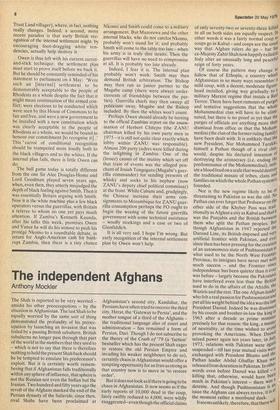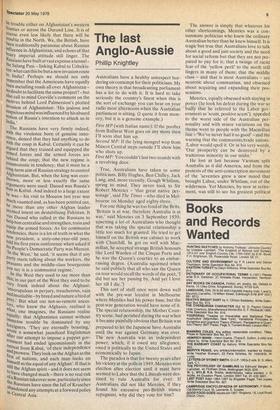The independent Afghans
Anthony Mockler
The Shah is reported to be very worried — amidst his other preoccupations — by the situation in Afghanistan. The last Shah to be equally worried by the same sort of thing demonstrated the profundity of his preoccupation by launching an invasion that was foiled by a passing British subaltern. British subalterns no longer pass through that part of the world in the numbers that they used to — which is not to say that there is therefore nothing to hold the present Shah back should he be tempted to emulate his predecessor's exploit. But it is certainly worth remembering that if Afghanistan falls traditionally within any sphere of influence, that sphere is not the Russian nor even the Indian but the Iranian. Two hundred and fifty years ago the revolt of the Afghans marked the end of the Persian dynasty of the Safavids; since then, rival Shahs have been proclaimed at Afghanistan's second city, Kandahar, the Persians have often tried to recover the third city, Herat, the 'Gateway to Persia', and the mother tongue of a third of the Afghanis — the traditional language also of court and administration — has remained a form of Persian, Dan. Though I do not subscribe to the theory of the Crash of '79 (a 'faction' bestseller which has the present Shah eager to restore the old Persian Empire and invading his weaker neighbours to do so), certainly chaos in Afghanistan would offer a tempting opportunity for an Iran as strong as that country now is to move in 'to restore order'.
But it does not look ash f there is going to be chaos in Afghanistan. It now seems as if the early reports of 10,000 dead in the coup, fairly swiftly reduced to 4,000, were wildly exaggerated—even though the official claims
of only seventy-two or seventy-three killed in all on both sides are equally suspect. ill other words it was a fairly normal coup as coups go in Kabul — and coups are the 100.1 way that Afghan rulers do go — bar his ex-Majesty Zahir Shah now happily exiled al Italy after an unusually long and peaceful reign of forty years. Of course the pattern may change r° follow that of Ethopia, a country which Afghanistan in so many ways resembles: a mild coup, with a decent, moderate figure' head installed, giving way gradually to LI military Marxist regime that instals a Red Terror. There have been rumours of purge and tentative suggestions that the whole Mohammedzai clan will have to be elirni* nated, but there is no proof as yet that the purges of officials are anything more thnn dismissal from office or that the Mohan: medzai (the clan of the former ruling familY) have been dealt with. It is unlikely that the new President, Nur Mohammed Taralcia, himself a Pathan though of a rival elan; would, despite his declared intention 01 destroying the aristocracy (i.e. ending the predominance of the Mohammedzai), ate a blood feud on a scale that would destraY the traditional mosaic of tribes, clans ant' families on which the whole Pathan systeth Is founded.
Nor is the new regime likely to be as threatening to Pakistan as was the old. Pathan can ever forget that Peshawar on the other side of the Khyber Pass was trod. itionally as Afghan a city as Kabul and the° was the Punjabis and the British between them who split the Pathan peoples. But though Afghanistan in 1947 rejected the Durand Line, its British-imposed and verY artificial frontier with Pakistan, and evet since then has been pressing for the creation of an autonomous state of Pushtoonistan!a what used to be the North West Frontier Province, its intrigues have never met viall much success — and the Frontier since independence has been quieter than it eve! was before — largely because the Pakistanis have interfered even less than the British used to do in the affairs of the Afridis, the Waziris and the rest. The one Afghan leacre,r who felt a real passion for Pushtoonistan an put all his weight behind the idea was the larde President Daoud. Indeed he was dismisse„ by his cousin and brother-in-law the kingn' 1963 after a decade as prime minister precisely for that reason: the king, a masre.of of neutrality, at the time wished to av°Id provoking the Americans. When Daau,,, seized power again ten years later, in 1973, relations with Pakistan were agora suspended — till last year mutual visits we,ra, exchanged with President Bhutto and rn' Pathan leader Abdul Ghaffar Khan via5 released from detention in Pakistan. In other words even before Daoud was killed a killing that, otherwise, would have bee° much in Pakistan's interest — there Was „s detente. And though Pushtoonistan is issue the Afghans can always revive, it 1511 the moment rather a moribund duck.
It seems unlikely, therefore, that there be trouble either on Afghanistan's western
frontier or across the Durand Line. It is of course even less likely that there will be The last trouble in the North. We, the British, have been traditionally paranoiac about Russian Influence in Afghanistan, and echoes of that hoary imperial attitude still linger. The Russians have built at vast expense a tunnel— the Salang Pass — linking Kabul to Uzbekistan: what can this be but a new invasion route to India? Perhaps we should not only remember that the Americans have equally been metalling roads all over Afghanistan — no doubt to facilitate the same project? — but also call to mind Greville's comment on the otives behind Lord Palmerston's plotted Invasion of Afghanistan: 'His jealous and suspicious mind was influenced by his absurd notion of Russia's intention to attack us in India.'
The Russians have very firmly indeed, With the virulence born of genuine innocence, denied that they had anything to do With the coup in Kabul. Certainly it can be argued that they trained and equipped the armed forces and the armed forces are behind the coup; that the new regime is e°, Mmunistic in tendency; that it must be a 'nag-term aim of Russian strategy to control Afghanistan. But, when the king was overthrown, more or less exactly the same arguments were used: Daoud was Russia's 'Ilan in Kabul. And indeed to a large extent be was — his visit to Moscow last year was Much vaunted and, as has been pointed out, he more than any other Afghan leader seemed intent on destabilising Pakistan. It L'vas Daoud who called in the Russians to
L'elp him centralise and strengthen, train and equip the armed forces. As for communist
tendencies, there is a lot of truth in what the ;10‘v president, a sixty-one-year-old poet, L't3.1d his first press conference when asked if 1,11s People's Democratic Party was Marxist.
In the West,' he said, 'it seems that if any Party starts talking about the workers, the Peasants and the middle-class bourgeoisie You say it is a communist regime.'
the West they used to say more than (Ins; in our part of the West they used to be ,verY frank indeed about the Afghani: unscrupulous in perjury, treacherous, vain and insatiable—by breed and nature a bird of Prey.' But what our not-so-remote ancestors, who knew the Afghanis, realised is What, one imagines, the Russians realise "(Wally: that Afghanistan cannot without trinmense trouble be dominated by any 'ereigners. 'They are eternally boasting,' wrote a somewhat jaundiced Englishman after our attempt to impose a puppet government had ended ignominiously in the retreat from Kabul, 'of their independence and Prowess. They look on the Afghan as the hi!at of nations, and each man looks on "1!'nself as the equal of any Afghan'. If that is sill the Afghan spirit — and it does not seem t'have changed much — there is no real risk ,(1,' a Russian takeover now, particularly since we Russians have since the fall of Kruschev abandoned any attempts at a forward policy In Central Asia.



































 Previous page
Previous page